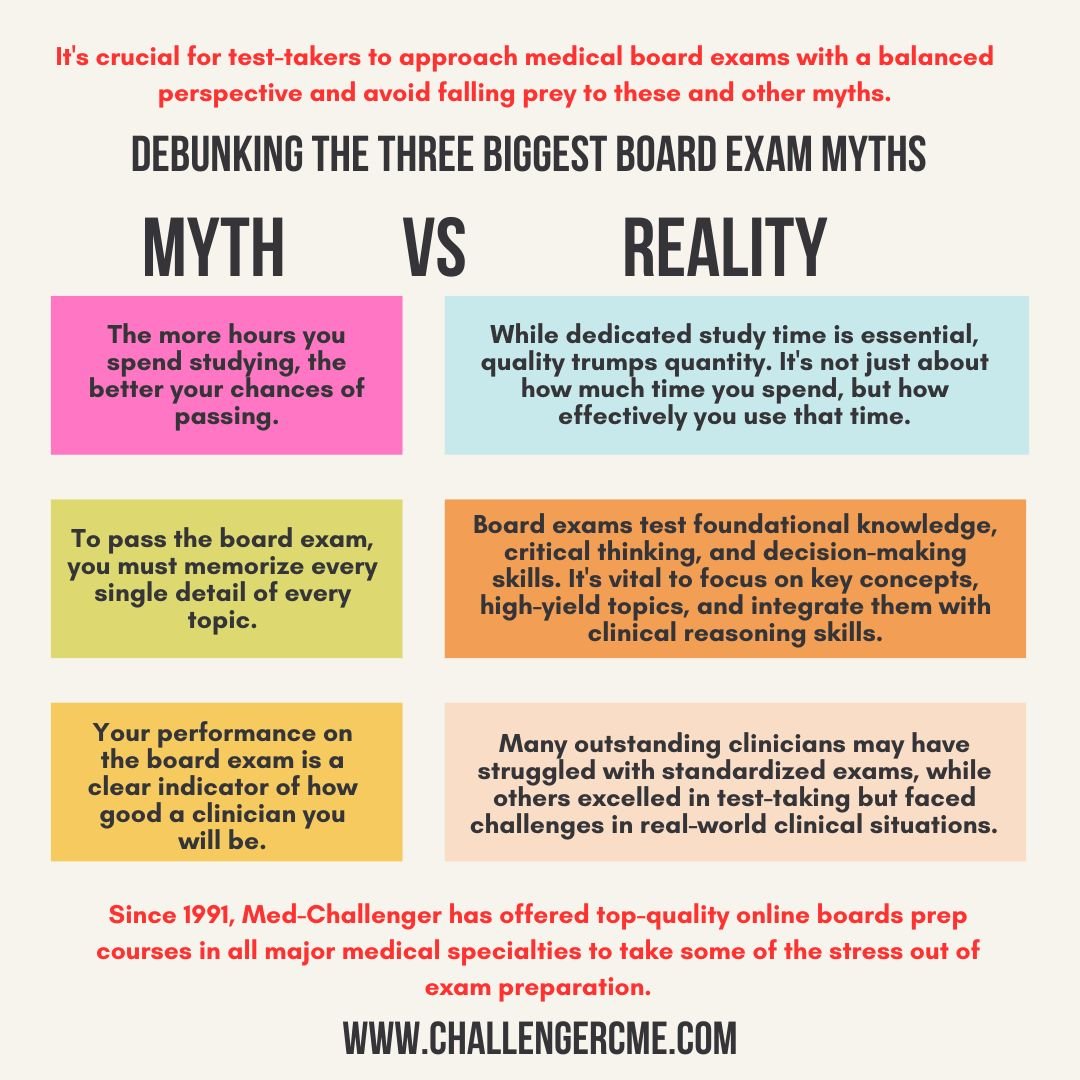1. Vast Amount of Material to Cover
Concern: The emergency medicine board exam covers a wide range of topics, how do I know where to focus my studies?
Solution:
- Create a Study Plan: Break down the ABEM blueprint into manageable sections and set a timeline for each. Prioritize high-yield topics and ensure you allocate enough time for revision.

- Use Quality Resources: Rely on trusted textbooks, review courses such as Med-Challenger's Emergency Medicine Courses, and question banks. Additionally, resources like the American College of Emergency Physicians (ACEP) can be particularly helpful.
- Practice Regularly: Consistent practice with sample questions and mock exams will help reinforce your knowledge and identify areas needing improvement.
👉 What is the Best Emergency Medicine Question Bank?
2. Balancing Study with Work and Personal Life
Concern: How can I juggle my demanding job and personal commitments while preparing for the ABEM exam?
Solution:
- Time Management: Set a realistic study schedule that fits around your work and personal life. Use tools like calendars or apps to keep track of your study sessions.
- Take Breaks: Avoid burnout by incorporating regular breaks and downtime into your routine. Quality study time is more important than quantity.
- Seek Support: Communicate your goals with family, friends, and colleagues. Their support and understanding can provide a positive environment for your preparation.
3. Anxiety About Exam Day
Concern: How can I relieve some of the pressure of performing well on ABEM exam day that's causing me significant anxiety?
Solution:
- Simulate Exam Conditions: Take practice exams under timed conditions to get used to the pressure. Familiarity can reduce anxiety.
- Mindfulness and Relaxation Techniques: Practices like meditation, deep breathing, and yoga can help calm your mind and improve focus.
- Plan Ahead: Ensure you know the exam location, have all necessary materials ready, and get a good night’s sleep before the exam day.
4. Knowledge Gaps
Concern: I am uncertain about the depth and breadth of medical knowledge needed. How can I ensure I am being updated with the latest guidelines and best practices for emergency medicine?
Solution:
- Continuous Learning: Stay updated with the latest guidelines and best practices through reputable medical journals, professional organizations, and continuing education courses.
- Identify Weak Areas: Regularly assess your knowledge to identify gaps. Focus your study on areas where you feel less confident.
- Utilize Up-to-Date Resources: Ensure you are using the most current study materials and guidelines. Engage in discussions with peers and mentors to clarify and update your knowledge. Identifying the most effective tools for passing the ABEM Exam can make a substantial difference in your performance.
👉 Preparing for the ABEM Exam: Study Strategies That Work
5. Fear of the Unknown
Concern: Not knowing what to expect on the exam can be unsettling. What can I expect on ABEM exam day?
Solution:
- Research the Exam Format: Understand the structure, types of questions, and scoring system of the exam. The American Board of Emergency Medicine (ABEM) website provides detailed information. Ensure your study resources cover all relevant topics as per the ABEM Blueprint.
- Join Study Groups: Connecting with peers who are also preparing for the exam can provide insights and reduce the feeling of isolation.
- Consult Past Candidates: Speaking with colleagues who have recently taken the exam can offer practical tips and first-hand experiences.
👉 What Do I Need to Know to Prepare for the ABEM Board Exam?
6. Self-Doubt and Imposter Syndrome
Concern: What if I struggle with self-doubt and the feeling that I am not adequately prepared, despite my hard work preparing for the ABEM exam?
Solution:
- Positive Self-Talk: Replace negative thoughts with positive affirmations. Remind yourself of your capabilities and the effort you’ve put in.
- Reflect on Achievements: Keep a record of your progress and successes, no matter how small. This can boost your confidence.
- Professional Support: Consider speaking with a mentor or coach who can provide encouragement and guidance.

FAQS for ABEM Test Taking Concerns and Solutions
Q1: How should I prioritize topics for the ABEM board exam?
A: Use the ABEM blueprint to guide your study. Focus first on high-yield emergency medicine topics, then review weaker areas using trusted resources and question banks.
Q2: How do residents balance ABEM exam prep with work and personal life?
A: Create a realistic study schedule that fits around residency duties. Short, focused study blocks and supportive communication with family or colleagues can help maintain balance.
Q3: What strategies help reduce anxiety on ABEM exam day?
A: Simulate exam conditions with timed practice tests, plan ahead for logistics, and use relaxation techniques such as deep breathing, mindfulness, or light exercise.
Q4: How can I keep up with the latest emergency medicine guidelines for ABEM prep?
A: Stay current by reviewing ACEP resources, reading EM journals, and using updated online study platforms like Med-Challenger that align with the latest ABEM blueprint.
Q5: What should I expect on ABEM exam day?
A: The ABEM Qualifying Exam is a full-day test with timed sessions and scheduled breaks. Expect multiple-choice questions, image-based scenarios, and case-based content.
Q6: How can I overcome self-doubt before the ABEM boards?
A: Track your progress with QBank analytics, reflect on your achievements, and practice positive self-talk. Connecting with mentors or peers can also boost confidence.
Q7: How far in advance should I start studying for the ABEM exam?
A: Most residents begin structured QBank study 3–6 months before the test, with more intensive review in the final 6–8 weeks.
👉 ABEM Board Exam Guide 2025
Taking the emergency medicine board exam is undoubtedly challenging, but with the right strategies and mindset, you can navigate these concerns effectively. Remember, preparation is not just about studying hard but also about taking care of your mental and physical well-being. Good luck!






